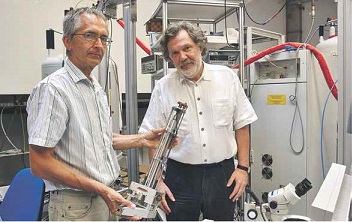News Archive
Patent granted for new DNP equipment
October 2015. Thomas Prisner and his research group at the Institute of Physical and Theoretical Chemistry of the Goethe University Frankfurt have developed a new DNP technology, which provides a 10 to 100-fold increase in sensitivity of NMR-Spectroscopy experiments so that dynamic processes can be observed now in very small sample volumes in their natural environment.
In nuclear magnetic resonance (NMR) minimal magnetic fields of hydrogen atoms are influenced and made visible through strong magnets. NMR spectroscopy is one of the most important methods for elucidating the structure and dynamics of biological molecules. Increasing the sensitivity has been an important goal as the sensitivity of conventional NMR spectrometers has not been sufficient to study larger biomolecules in their natural environment. The sensitivity can be increased to a certain extend either by applying a stronger external magnetic field or by using specific pulse methods.
Dynamic nuclear polarization (DNP) is a particularly promising method for increasing the sensitivity of NMR measurements of biomolecules. DNP results from the transfer of spin polarization from electrons to nuclei. To make DNP usable in NMR spectroscopy, the electron spin polarizations first has to be transferred to the nuclear spin system. Samples are excited at an electron spin resonance frequency referred to as the electronic paramagnetic resonance (EPR) frequency, which in applications of practical relevance is always in the microwave range. Thomas Prisner and his colleague Vasyl Denysenkov make particularly efficient use of this effect in their newly developed DNP probe head, the central part of modern NMR systems. Goethe University filed for patent for this new apparatus and patents were granted for Europe, Japan and the United States (DE 10 2008 017 135 B4, US 8,570,033 B2).

Vasyl Denysenkov (left) and Thomas Prisner (right) with their new DNP probehead (photo: Lecher).
Contact:
Thomas Prisner
Institute of Physical and Theoretical Chemistry
Goethe University Frankfurt
prisner@chemie.uni-frankfurt.de

